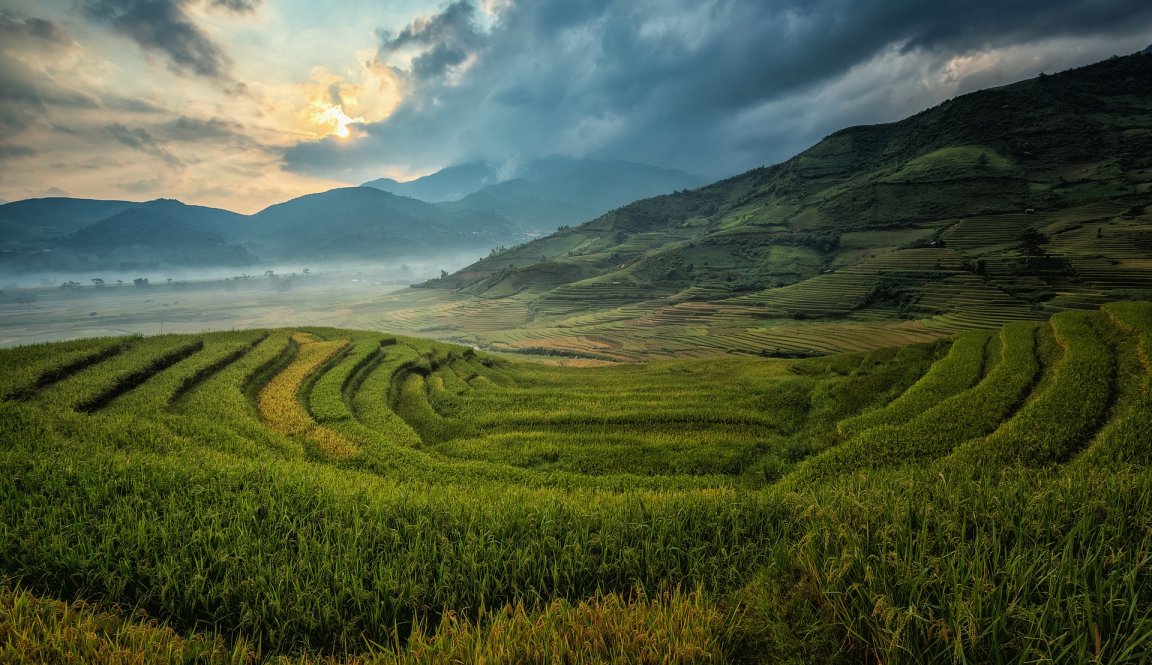
China: Old Country, New Tricks
More than half the global population relies on rice to survive, but meeting that demand is difficult due to the increasing scarcity of freshwater, which is required for rice cultivation. To get around the problem, an 87-year-old Chinese scientist named Yuan Longping is developing a new high-yield strain of rice that grows in saltwater.
Swamps, bogs, and clay-like or salty coastal waters make up roughly a third of the total arable land in China. Growing rice in these locales is nearly impossible because salt stresses plants’ water-absorption process. Specifically, saltwater makes photosynthesis and respiration more difficult for stalks and slows their growth to death.
Salt from coastal flooding and tides has left just a fraction of China’s total land open to freshwater rice farming, and in Dongying, a region on China’s eastern coast, 40 percent of land has a salt concentration higher than 0.5 percent, according to the World Bank. Experts expect the rising waters from global climate change to exacerbate this problem.

For his research, Longping planted 200 different saltwater-tolerant rice strains at the Qindao Saline-Alkali Tolerant Rice Research and Development Center on the Yellow Sea. According to China’s Xinhua News Agency, his efforts yielded 8,030 pounds of rice per acre. For comparison, most commercial U.S. growers harvest between 7,200-7,600 pounds per acre annually.
Though promising, Longping’s experiment did not mimic the actual conditions in China, instead using water with a much lower salt concentration than could be found in nature.
“It’s still only maybe 10 percent the level of salt in sea water,” Assistant Director General for Agriculture at the United Nations’ Food and Agriculture Organization (UN FAO) Ren Wang told Business Insider, so the “salt-proof” rice does have a long way to go before it could help ordinary farmers.
The Future of Food
China already produces more rice than any other country on Earth, but if Chinese farmers had access to rice that grows in saltwater, they could plant it in the vast saltwater lands of their country, increasing the nation’s food supply significantly, Wang told Business Insider.
Longping’s rice could also free up freshwater lands that are currently reserved for rice to grow other foods. More affluent Chinese citizens are demanding more meat and less grain-based food, but meeting that need has proven increasingly difficult given the amount of freshwater land reserved for rice cultivation.

Longping’s early success with rice that grows in saltwater also comes at a time when rice producers are reporting particularly unfavorable conditions.
According to the UN FAO’s 2017 global rice production forecast, Sri Lanka and South Korea are experiencing “abnormal dryness,” and Bangladesh recently suffered the worst flooding to hit South Asia in a decade. Nepal and India were also hit by floods and droughts this year, and citizens of those nations will consequently see an increase in prices.
With ice shelves the size of Delaware breaking off the Antarctic with increasing frequency, Longping’s approach to agricultural innovation may determine how future generations cope with the food scarcity that could follow the loss of freshwater land to saltwater flooding.